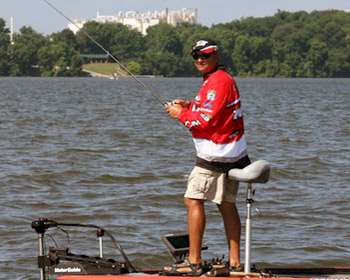
We've all been there at least once. For some of us it's where we seem to stay — locked into a daydream while awaiting a subtle nudge from a bass that just refuses to cooperate. It's during these times, when bites are few and far between, that most of us seem to check out mentally.
However, if you're an Elite Series pro who's contending for a paycheck, "calling it a day" isn't an option. Instead, as Texas pro Matt Reed points out, maintaining mental focus when bites are rare is what separates good anglers from the pack. "It's something you really have to work on," the 46-year-old Elite Series pro contends.
"You have to mentally focus on what you're doing at all times and stay in contact with your bait." Reed maintains that keeping contact with your bait and your surroundings is the best remedy for a wandering mind. "If you're not focused on what you're doing, your mind starts thinking of all the things that you could be doing instead," he points out. "A lot of days, you're only fishing for five bites.
If you're not paying attention, chances are pretty good that you'll miss one or two of them completely." Mental focus means ignoring everything else except your line, lure, and the bass. And Reed points out some tricks for maintaining that mental sharpness. First, he says, ensure that your body stays fueled and hydrated. "In my earlier years, I wouldn't eat or drink during the day," he says. "Now, I put two sandwiches and some drinks in the boat, and force myself to eat and drink them. If I don't, I know that at some point in the day I'll start thinking about how hungry I am.
Plus, if you don't eat you start to lose your energy." National television exposure has allowed bass fishing fans to witness firsthand the physical endurance required to compete on the Elite Series, but Reed cautions that the physical aspect is only the beginning. "It's as much a mental game as it is a physical one," he allows. "Keeping yourself tuned in and your body comfortable is as much a key as anything towards keeping your mental focus."
The "mental edge," as it's often described, is a characteristic that top-level pros are often born with; however, developing and refining one's mental game requires time and attention to detail. "I would say that by spending time on the water and paying attention to any little key that might be triggering a bite is critical to developing a mental edge," he says. "If you're not focused on what's going on, you're going to miss the clues.
"For example, if you're fishing a shoreline and notice a blue heron feeding, you should key into the fact that baitfish are present. That heron has to eat for a living, and it's not there by accident. Figure out what it is that he's focused on, and chances are you'll find bass there too." By staying focused, you can turn a slow day quickly into a memorable one.
"It happens to me all the time," Reed says. "Anglers who fish the Elite Series have to make adjustments on the water based solely on the clues we're reading from our surroundings." Keeping focus on the slow days and picking up on the subtle clues that nature provides can, and will, increase your chances of overcoming a slow day.
As Reed explains, "All the keys that nature provides go together. If you can put together the clues, the pieces will fall into place."
(Provided by Z3 Media)




